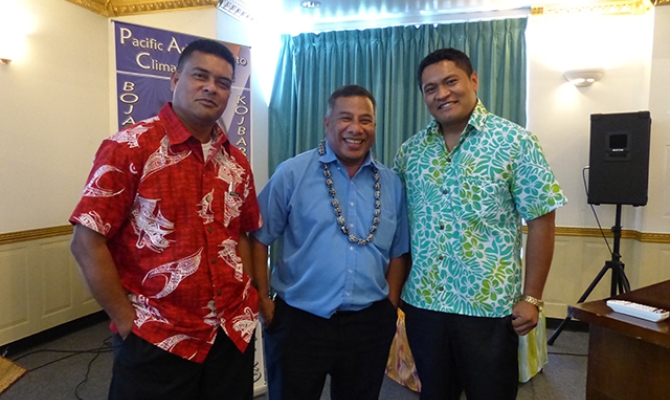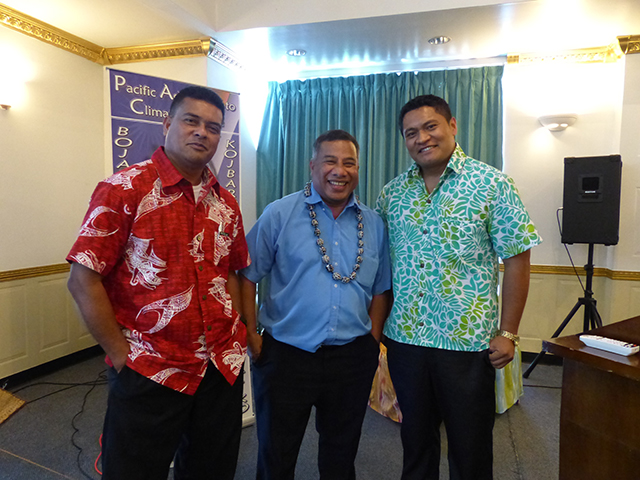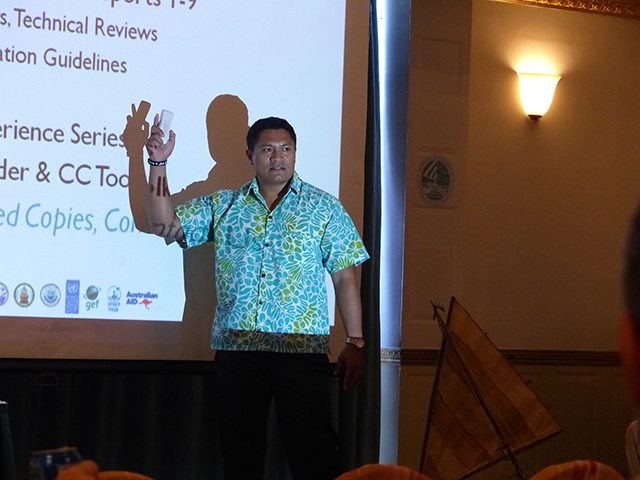
Climate Change Resilience
30 September 2014, Majuro, Republic of Marshall Islands - Delegates to the 25th Annual Meeting of the Pacific Regional Environment Programme today had the opportunity to hear first-hand accounts of success stories and lessons learned arising from the world class Pacific Adaptation to Climate Change (PACC) programme.
The PACC programme is the first major climate change adaptation initiative in the Pacific region. Since it began in 2009 the programme has been demonstrating best-practice adaptation in three key climate-sensitive areas: coastal zone management, food security and food production, and water resources management.
With the programme slated to wrap up in the first quarter of 2015, an emphasis for the next six months (aside from evaluation activities) will be on collecting and disseminating the vast array of insights, results and impacts deriving from more than five years of intervention.
While PACC has operated in 14 different Pacific islands, the focus of today's event was on the unique experiences of northern Pacific countries.
PACC Coordinators Joseph Cain and Abraham Simpson presented on the PACC interventions in Marshall Islands and Federated States of Micronesia respectively, painting a comprehensive before and after picture of risks and opportunities.

For Mr Peniamina Leavai, SPREP's Adaptation Planning Officer for PACC, the high level of audience interest and engagement indicated that today's event was a great success. Mr Leavai explains:
"There is a real appreciation that PACC has the capacity to live on through the development of new programmes based on our lessons and best practices. That capacity to address climate change across different sectors - through incorporating risks and trying out resilience measures - was made clear."
"And importantly, it was great to note that almost all of our knowledge management products were picked up by interested parties. It goes to show that exchange of information is valued and that PACC experiences are important in helping us to shape our future programmes and projects."
By way of example, Mr Mosese Sivovou of the Secretariat of the Pacific Community (SPC) commented at the event that the results, tools and frameworks from the PACC programme are being referred to and used by other resilience projects in the region. The lessons learned from PACC support the effectiveness and relevance of other programmes and ensure that efforts are not duplicated.

For more information about PACC, please visit www.sprep.org/pacc
The PACC programme is funded by the Global Environment Facility and the Australian Government. The Secretariat of the Pacific Regional Environment Programme (SPREP) is the regional executing agency and the United Nations Development Programme (UNDP) is the implementing agency.
The PACC programme is the first major climate change adaptation initiative in the Pacific region. Since it began in 2009 the programme has been demonstrating best-practice adaptation in three key climate-sensitive areas: coastal zone management, food security and food production, and water resources management.
With the programme slated to wrap up in the first quarter of 2015, an emphasis for the next six months (aside from evaluation activities) will be on collecting and disseminating the vast array of insights, results and impacts deriving from more than five years of intervention.
While PACC has operated in 14 different Pacific islands, the focus of today's event was on the unique experiences of northern Pacific countries.
PACC Coordinators Joseph Cain and Abraham Simpson presented on the PACC interventions in Marshall Islands and Federated States of Micronesia respectively, painting a comprehensive before and after picture of risks and opportunities.

Mr Peniamina Leavai (right) with Mr Joseph Cain (centre) and Mr Abraham Simpson (left) at today's event.
For Mr Peniamina Leavai, SPREP's Adaptation Planning Officer for PACC, the high level of audience interest and engagement indicated that today's event was a great success. Mr Leavai explains:
"There is a real appreciation that PACC has the capacity to live on through the development of new programmes based on our lessons and best practices. That capacity to address climate change across different sectors - through incorporating risks and trying out resilience measures - was made clear."
"And importantly, it was great to note that almost all of our knowledge management products were picked up by interested parties. It goes to show that exchange of information is valued and that PACC experiences are important in helping us to shape our future programmes and projects."
By way of example, Mr Mosese Sivovou of the Secretariat of the Pacific Community (SPC) commented at the event that the results, tools and frameworks from the PACC programme are being referred to and used by other resilience projects in the region. The lessons learned from PACC support the effectiveness and relevance of other programmes and ensure that efforts are not duplicated.

Mr Peniamina Leavai presenting at today's PACC side event.
For more information about PACC, please visit www.sprep.org/pacc
The PACC programme is funded by the Global Environment Facility and the Australian Government. The Secretariat of the Pacific Regional Environment Programme (SPREP) is the regional executing agency and the United Nations Development Programme (UNDP) is the implementing agency.